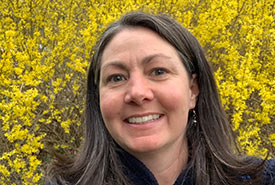NCC reports back from the first day of the Convention on Biological Diversity summit

Dawn Carr with blooming forsythia in Geneva, Switzerland (Photo by NCC)
After a long and restless flight from Montreal, I arrived in Geneva, Switzerland, late Sunday morning in advance of the Convention on Biological Diversity (CBD) summit prior to COP15. With luggage in hand and my brain and body full of excitement, I made it to my new home for the next two-plus weeks.
This is the first time in over two years that the world has been able to convene in-person to negotiate a global agreement for nature. These meetings are also going to be the last time 196 nations get together before the final round of negotiations occur, likely in late summer, where a new global agreement to safeguard nature will be (hopefully) confirmed at the Conference of the Parties.
This internationally significant agreement is called the Post-2020 Global Biodiversity Framework because it was supposed to be finished and ready to implement in 2020, when the last set of global targets expired — then the pandemic hit. Meeting in-person to debate the current draft is seen as the most equitable way for all countries to have input because so many countries cannot effectively participate due to poor technology infrastructure or other connectivity issues.
This is the first international CBD meeting that the Nature Conservancy of Canada (NCC) has participated in, having received accreditation as an official Observer this past winter. I am so proud to be representing NCC — the largest national conservation NGO participating in-person in Geneva along with other government organizations and conservation experts as part of the Canadian delegation!
One of the biggest outcomes of these meetings, should the draft text be supported, is to protect 30 per cent of our global lands and waters by 2030. Canada has committed to this target and aims to protect 25 per cent by 2025. The CBD provides the process, and ultimately the framework, that will solidify Canada’s commitment.
Monday was the first full day of meetings. It was amazing to see the world together again, talking about the importance of nature from all corners of the Earth. All 196 parties to the CBD are working together to create real and measurable targets to protect, conserve and sustain nature on land and in water — resources we all depend on for our collective health and well-being.
One of the emerging themes is that multilateral cooperation is necessary to halt and reverse biodiversity loss by 2030 and to achieve full nature recovery by 2050, which is a hope for this work, moving forward.
Over the lunch break, I attended a side event with global business leaders to discuss how to ensure the value of nature is embedded in decision making. Key takeaways included the need to create binding regulatory requirements, predictability and fairness to create and support the economic transformation needed to sustain biodiversity.
The late-afternoon session focussed on further context to the draft Global Biodiversity Framework. This draft document will morph into a final version and be presented to all of the countries for approval and ratification in the months ahead.
There are so many critical issues these discussions tackle — from restoration to sustainable use across the landscape and sectors, and to working in partnership with Indigenous Peoples and local communities. As Canada’s leading national non-profit for private conservation in Canada, NCC is committed to playing a significant role in accelerating conservation at home and in communities for the global good.
It is so exciting being a part of the action, learning how NCC can be even more effective in the months and years ahead as we work to toward a new set of targets that will take us to 2030 and beyond.
I look forward to continuing to share my observations as the days progress!


